Celebrating ordinary people emerging as heroes of the COVID-19 pandemic
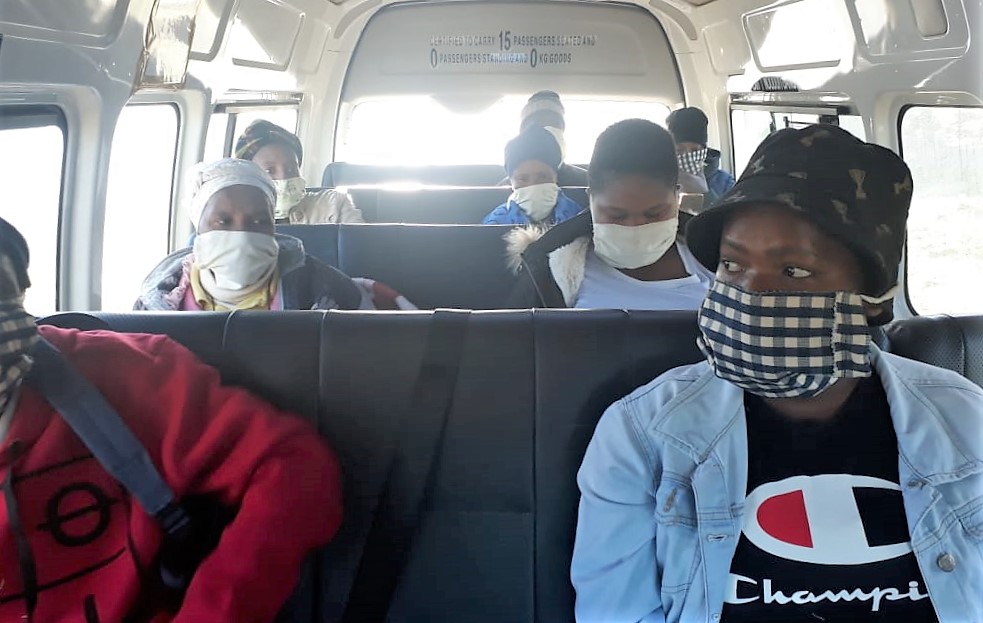
Long before the dust started settling on the mask-or-not debate, people in Rhodes Village and its Zakhele township in the mountains near the South Africa-Lesotho border were crossing old barriers to make masks and get them to as many people as possible – for free.
The participants in this effort understand implicitly that wearing masks will not stop you from acquiring the coronavirus that causes COVID-19. They know that it’s just one action to help stem the spread of the virus: you still need to wash your hands, avoid touching your face and keep a physical distance.
After furious debate, the Centers for Disease Control and Prevention (CDC) has, at last, announced that it recommends “everyone wear a cloth face covering when going out into public areas for essential services”. The Western Cape Department of Health explains how and why to use cloth masks: they help reduce transmission of droplets from coughing or sneezing and inhaling of droplets; they also create awareness and are inexpensive.
The mask makers of Rhodes Village and Zakhele formed a WhatsApp group to plan and discuss making masks and distributing cut fabric. It’s just been ramped up to a fully-fledged and active coronavirus information-sharing group.
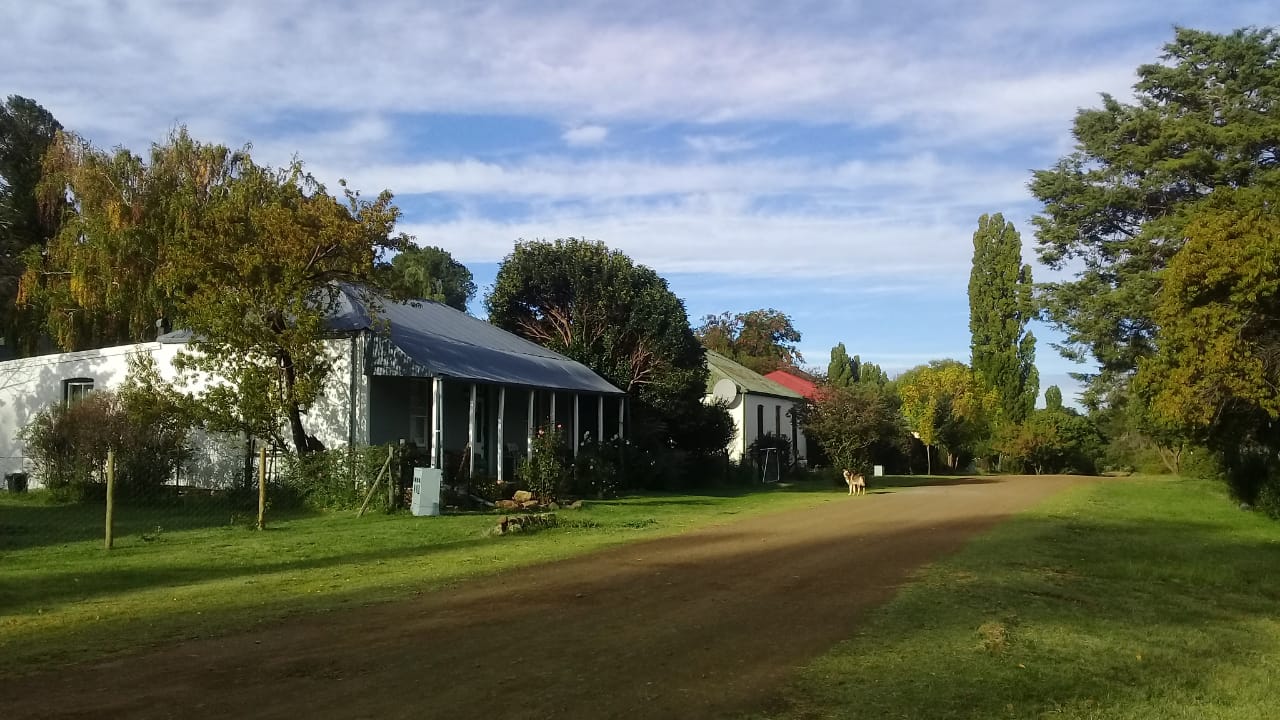

If the coronavirus had not turned the world on its head, I would have been in Rhodes Village this week. Instead, I’ve been watching the mask-making project gather steam from afar. And I’ve been humbled and inspired. Here, leaders are rising.
Meet some of the people active in the group: Nosikhunge Angelina Maquba; Thatho “Leki” Mojake; Sharlene Sankey; Malebohang Letsika; Xolelwe “Xollie” Yaleko; Caroline Reeders; and Fiona Adams.
Nosikhunge Angelina Maquba

Nosikhunge, a dressmaker in Zakhele, is a star sewing person in the Rhodes Village-Zakhele mask-making group. She is making the most of the lockdown by sewing masks through the day and often into the night in the home she shares with her two children. Her husband is working in Cape Town.
Nosikhunge, who also works as a domestic worker in Rhodes Village, learned to sew from the owner of a farm where she was working. “I started sewing church items and I realised that I loved sewing,” she says. A few years ago, she bought herself an electric sewing machine and she’s never looked back. She takes orders for dresses and traditional clothing.
She explains:
“When Xollie told me about why we need to make masks, I saw an opportunity to help my community, even an opportunity to help save lives. Fiona sent some videos, a pattern and samples – it’s so easy to make these masks.”
Sometimes, Leki helps her sew masks. Nosikhunge has also been teaching her younger sister, Sisiwe, and her friend, Thembi, how to make them.
She is deeply satisfied to know that a lot of people in Zakhele and on surrounding farms now each have at least one homemade mask. “We should each have three masks and that is our next goal. Now that I have helpers, we have the chance to make sure that we each have three.
“I hope that when other communities learn about what we are doing, they will know that we must all take care of ourselves and each other by doing things freely for our community.”
Thatho “Leki” Mojake

Leki, 32, lives in Zakhele with his wife and three children. He is a soccer player who works for the local brewer, doing “everything” from carpentry to building. He’s also a proud mask maker and COVID-19 educator. He got involved with the mask project after he had could not find any for sale.
“Rhodes is far from the big cities,” he says. “If we don’t look after each other, no-one else will.”
Leki is a central person in the mask-making project. He picks up cut fabric, ready for sewing, from Fiona, and takes it to Nosikhunge’s home, where he helps sew them. Then he distributes the masks to people in the community.

His mother had shown him how to sew by hand and Sharlene helped him even more, showing him how to make the masks. “I’m a man,” he laughs, “so it was quite difficult to start with. But now I know what I am doing.”
In the mornings, he visits the taxi before it leaves for the town of Barkly East, about 60km away. “I tell people about social distancing – now the 15-seater is taking only 10 passengers – and washing their hands. And I give them masks and show them how to use them. “It’s not always easy. Those passengers who have heard the news, they listen. A few treat me as if I’m telling a joke. But the taxi drivers know that this is serious.”
The police, too, know that the pandemic is serious, Leki says, and support his efforts.
Sharlene Sankey

Sharlene is a teacher and artist who works in the local Clay Café. She’s lived in Rhodes Village for the past six years.
“This is the first time we’ve had a WhatsApp group that includes both Rhodes Village and Zakhele,” she says.
“We’ve been very separated. The mask-making group has given us a very good opening to build bridges and we want to keep it going.”
Sharlene came up with the innovation of using a reed or a piece of stiff grass to thread the elastic or ties through masks. “This is something that people can easily find: if you bend a piece of grass in half, it works just like a threading needle,” she says.
A skilled sewing person, she’s been empowering others with the tools and knowledge for mask making. “Fiona experimented with the design and brought some, cut out, to me. I then showed others, like Leki and Malebohang, how to make them.
“People tend to think if they don’t have a machine, they can’t do it, but that’s not true. For an inexperienced sewer, it should take no longer than 15 minutes to make one.”
Malebohang Letsika
Malebohang is a pottery painter and domestic worker. After her employer, Sharlene, taught her how to sew masks by hand, she showed her neighbours, two families, how to make them – she sat on a chair outside their fence, keeping a physical distance, while she taught them.
Malebohang works at the Clay Café for three days a week where she helps with many aspects of pottery. She is a skilled pottery painter with a steady hand.
Xolelwe “Xollie” Yaleko
Xollie (having fun with a phone camera with her children in the gallery above) was born in the Rhodes Village area. Apart from four years in Johannesburg, she has always lived there. She works at the Rhodes Tourist and Information Centre.
She is a driver and facilitator of the mask project, playing a COVID-19 educational role and ensuring that people of Zakhele are part of the group. “People around me are responding so positively,” she says.
“Leki is responsible for distribution of the masks, and since we’ve started giving them out, almost everyone, even those on taxis, are wearing our homemade masks.”
Xollie says the mask-making efforts are breaking down old barriers.
“Until now, people in Zakhele have not known what’s going on in town. This group is changing that. It involves black and white people, who are united, working together to fight this horrible disease.
“This group is a blessing. We can work together now and we can work together in the future.”
Caroline Reeders
Caroline is a farmer’s wife who has lived in the area for around 30 years. She sees her mask making as a way to give back to her neighbours in Zakhele.
“The community has done a lot for us,” she says. “When we had a runaway fire and my husband was away a few years ago, I drove into the township … Before I knew it, people had piled onto the vehicle. They picked up things to beat the fire – and they killed it. Then they refused any payment.”
So the mask making “came naturally. I saw that I could do something. I have material, elastic, a sewing machine and things to recycle, like old sheets. All it takes is my time, which I am happy to give.
“Fiona was my inspiration. She gave me a pattern, with printed instructions in Xhosa for how to use the mask, which I appreciated.”
Caroline, with others like villager Elize Kloppers, initially made masks for the hospital in Barkly East following an appeal for homemade masks for patients so that medical masks could be kept for medical staff. She also made masks for workers on her farm, and continues making for Zakhele residents.
“Through this simple platform of making masks, the people of Rhodes can show an example of how we can work together. This virus can take anyone – it is a leveller and brings us together.”
Fiona Adams

Fiona, a retired photographic archivist and historical researcher, is one of the newest residents of Rhodes Village. She moved there, from East London, less than a year ago.
She cannot use a sewing machine. Yet she came up with an easy mask design that could be used by anyone, whether by hand or machine. Fiona experimented with YouTube videos, hand sewing and adapting designs with the help of Jill Steynberg, a talented seamstress in the village, until she was satisfied. Then she cut up her entire shweshwe fabric collection to make masks.
“It was important that the pattern was as simple as possible so a few people could make a lot of masks quickly,” Fiona says. “So we use pinking shears, for example, instead of turning in the edges. Rather than pleating the sides, we use ties to pull the edges in so that the mask can be adapted to different face sizes.”
She insists the project was not all her doing, but rather a community effort. Sharlene showed Leki and Malebohang how to make the masks by hand. Caroline and Elize are solid supporters, as is farmer Margie Murray. Nosikhunge, Malebohang and Leki have taken it and run with it. And Xollie ties it all together.
“There was a rush to get it all underway before the lockdown, and it’s continued to grow with more and more people getting involved.
“The only reason we can do this for free is because everything is donated, from materials to time. Using only what we have, we’ve been able to produce a lot of masks – more than 400 so far. People here have always had to rely on their own resources, and even more so during lockdown.”
One of the most valuable aspects is the rich diversity of the mask makers. “We have men and women, farmers, villagers and township residents, all working together. That’s quite an unusual group for this area. We don’t pretend this is an earth-shaking change, but it’s a practical start that lays a foundation for good things in the future.”



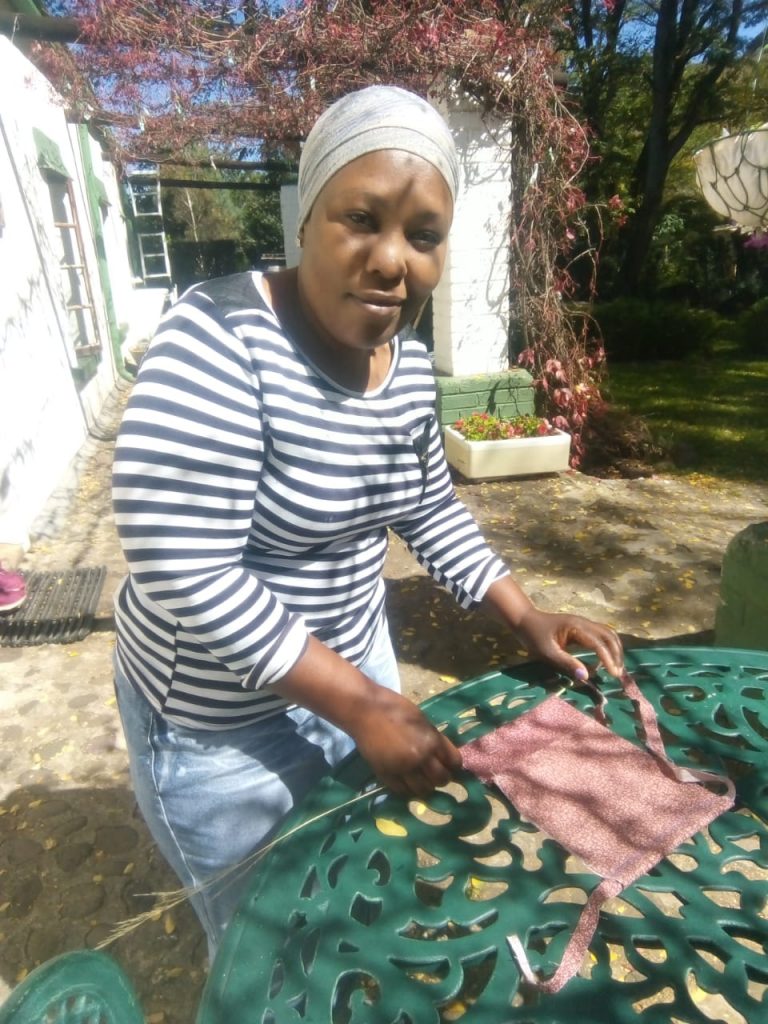








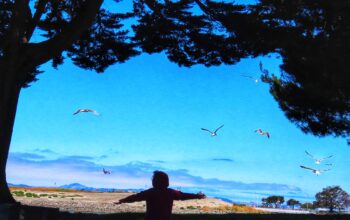
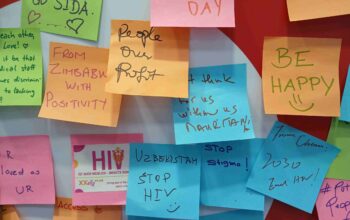

Well done Rhodes Village!!!!.
Thanks for this interesting post, and just to let you know that I have provided a link to your post on my recent post featuring the village of Rhodes.
Thank you so much for spreading the word about these wonderful people. I understand they’ve made and distributed well over 1,000 masks.